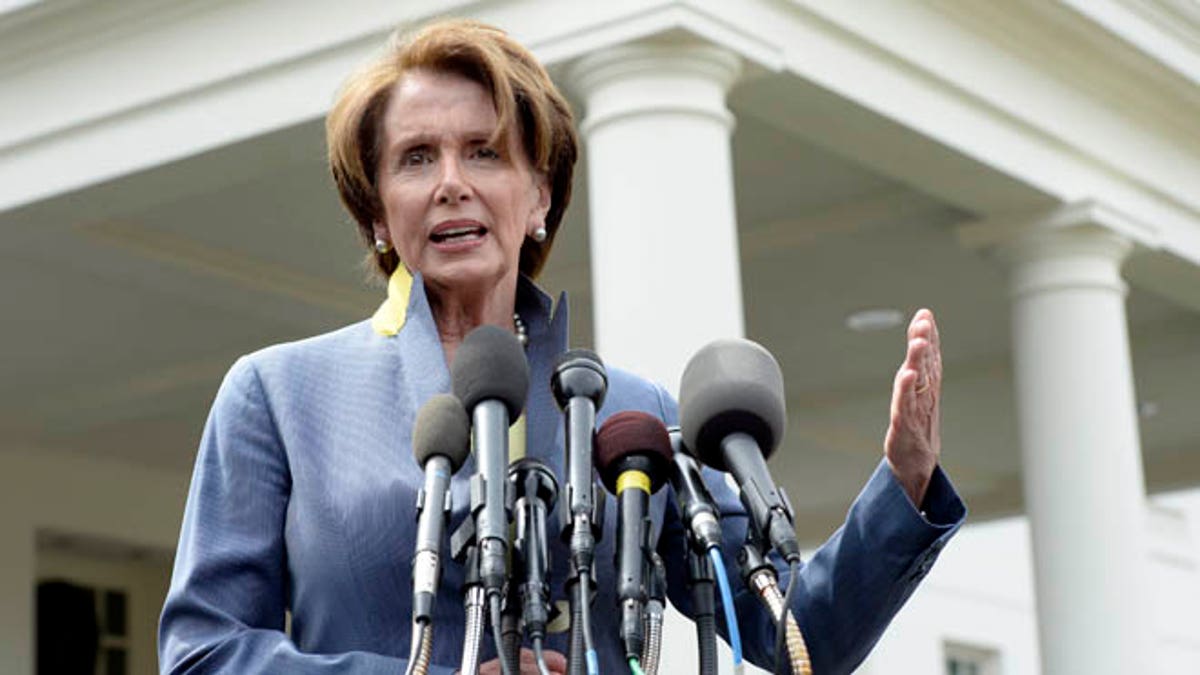
April 1, 2014: House Minority Leader Nancy Pelosi speaks to reporters outside the West Wing of the White House. (AP)
If the upcoming spring recess on Capitol Hill is the unofficial kick-off to the midterm races, congressional lawmakers sure are warming up.
Lately, they've been bickering -- a lot -- over dueling budget plans, with the latest version pioneered by House Budget Committee Chairman Paul Ryan, R-Wis., dominating the dialogue. That plan was approved in the House on Thursday.
Many Republicans here are praising its cuts to government spending, with many Democrats demagoguing them. Here's why:
The Ryan plan, proponents say, will start to tackle America's crushing debt by slashing more than $5 trillion in projected spending and balancing the budget in the next 10 years. It achieves this by, among other things, reforming entitlement spending, repealing ObamaCare and scaling back on social programs like food stamps -- where spending has grown exponentially in recent years.
"We believe that this is our obligation to our fellow citizens to get out government to live within its means," Ryan said. "A country that lives beyond its means today is a country that will necessarily have to live below its means tomorrow and we do not want to do that to our children and our grandchildren. Getting government to live within its means, balancing the budget, paying off the debt is good for economic growth."
In a debate that falls against the looming 2014 midterms, Democrats have a drastically different take.
They say the Ryan budget protects the wealthiest of Americans, while its cuts to education and social programs target children and seniors.
"I view the Ryan budget as an ideological manifesto," House Minority Leader Nancy Pelosi, D-Calif., said. "It's a tragedy for the country."
The top Democrat on the House Budget Committee Chris Van Hollen, D-Md., added that the plan, "at every turn, chooses to protect special interests tax breaks for powerful special interests, at the expense of everybody else in the country."
And House Minority Whip Steny Hoyer, D-Md., called it a "blueprint for economic decline, for vulnerable Americans being left to fend for themselves," and for, "an America less equipped to protect its citizens."
Budgets everywhere
To counter their colleagues across the aisle, the Democrats are offering an alternative. It includes tax hikes of close to $2 trillion and spending increases of more than $700 billion, opponents say. ObamaCare remains intact, unemployment insurance is extended, and comprehensive immigration reform is even included. The House's congressional black and progressive caucuses also rolled out their own budget plans.
Even South Carolina Republican Rep. Mick Mulvaney got in on the action, offering what he characterized as President Obama's budget, just to show how little support there was for it in the House. It got two votes after Van Hollen sent out a letter to his colleagues calling it a "political stunt."
Arguably, there is no need to do a budget this year. Discretionary spending levels were already set at $1.014 trillion after Ryan and Senate Budget Committee Chairman Patty Murray, D-Wash., struck a deal which passed both chambers.
It will be a series of appropriations bills, which will pass within that spending level, that ultimately become law. All of these currently debated budget resolutions are non-binding.
So what's the point?
Republicans and Democrats alike will say budgets reflect priorities and show the American people what lawmakers care about, and what they don't. They are also filled with what some operatives call Easter eggs, or treasures which appeal to a party base.
Off to the races
Further, budgets are a handy money-raising tool.
The Democratic Congressional Campaign Committee has actually been fundraising off the Ryan budget ever since House Speaker John Boehner said it would be crafted back in February. In fact, that month was one of the strongest the DCCC ever had with its grassroots donors. Their effort kicked into high gear this week with a blast of additional fundraising emails.
"This budget motivates our grassroots supporters, who are so furious about Washington Republicans stacking the deck for special interests," DCCC National Press Secretary Josh Schwerin told Fox News.
DCCC Chairman Rep Steve Israel, D-N.Y., who said the Ryan budget "should have just printed a middle finger to the middle class on page one," also called the plan a defining issue in the midterms.
Asked this week if all this was enough for the Democrats to take control of the House back, Pelosi put the brakes on.
"We're not thinking politically on this," she said. "We just want to have a debate on the issues because this is about who we are as a country."
Capitol Attitude is a weekly column written by members of the Fox News Capitol Hill team. Their articles take you inside the halls of Congress, and cover the spectrum of policy issues being introduced, debated and voted on there.




